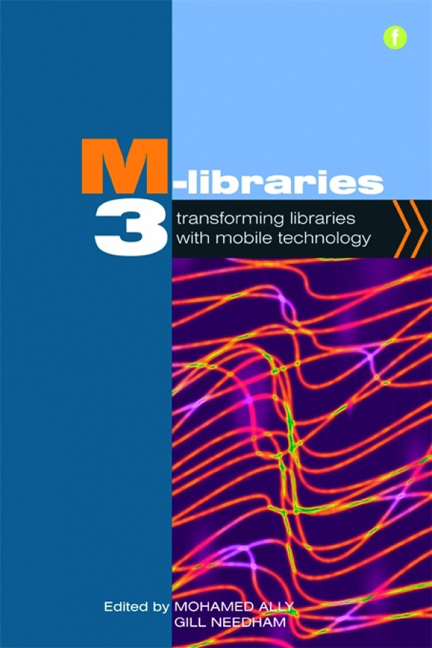Book contents
- Frontmatter
- Contents
- Acknowledgements
- Contributors
- Foreword
- Introduction
- 1 Education for all with mobile technology: the role of libraries
- PART 1 DEVELOPING MOBILE SERVICES
- 2 Preparing for the mobile world: experimenting with changing technologies and applications for library services
- 3 Enhancing open distance learning library services with mobile technologies
- 4 Use of mobile phones in the delivery of consumer health information
- 5 Deploying an e-reader loan service at an online university
- 6 Mobile service providers and library services in a multi-campus library
- 7 Using mobile technology to deliver information in audio format: learning by listening
- 8 Sound selection: podcasts prove positive
- PART 2 PEOPLE AND SKILLS
- PART 3 FOCUS ON TECHNOLOGY
- Conclusion
- Index
8 - Sound selection: podcasts prove positive
from PART 1 - DEVELOPING MOBILE SERVICES
Published online by Cambridge University Press: 08 June 2018
- Frontmatter
- Contents
- Acknowledgements
- Contributors
- Foreword
- Introduction
- 1 Education for all with mobile technology: the role of libraries
- PART 1 DEVELOPING MOBILE SERVICES
- 2 Preparing for the mobile world: experimenting with changing technologies and applications for library services
- 3 Enhancing open distance learning library services with mobile technologies
- 4 Use of mobile phones in the delivery of consumer health information
- 5 Deploying an e-reader loan service at an online university
- 6 Mobile service providers and library services in a multi-campus library
- 7 Using mobile technology to deliver information in audio format: learning by listening
- 8 Sound selection: podcasts prove positive
- PART 2 PEOPLE AND SKILLS
- PART 3 FOCUS ON TECHNOLOGY
- Conclusion
- Index
Summary
Introduction
The Toowoomba Clinical Library has introduced and established a service whereby clinically oriented audio presentations are provided to the health professionals throughout the region it serves. This chapter describes its inception and progression.
In many ways, this is a project that is all about mobile information technologies – about MP3 files and podcasting software and iPod shuffles. In some crucial ways, though, the technology is almost the side issue, or at the very least was not the driver of the success that this service seems to have achieved. In his recent manifesto ‘You are not a gadget’ Jaron Lanier (2010) claimed ‘The central mistake of recent digital culture is to chop up a network of individuals so finely that you end up with a mush. You then start to care about the abstraction of the network more than the real people who are networked, even though the network by itself is meaningless. Only the people were ever meaningful.’ It is an obvious statement, yet a profound observation, and one of which the Library has tried to remain cognizant in all its work.
The major role of a clinical library service is to be aware of quality content and to connect clients – doctors and nurses and allied health workers – with it. It is they who make decisions about patient care, who strive to practise from a sound evidence base, who must provide safe, effective and cost-efficient health interventions. To do this, clinicians require information. The eminent UK physician Sir Muir Gray has consistently argued in many forums that in the 21st century knowledge is the key to improving health. In the same way that people need clean, clear water, they have a right to clean, clear knowledge. He has also claimed that the greatest future advances in healthcare will come not from new inventions and discoveries but from the application of what we already know. To that end, it is the work of the library and its information professionals to meet the need – to put the right information in the right context and the right container for the right client. This project is one small contribution towards meeting that need.
Where did we start?
For several years the Library had loaned first audio cassette and later audio CD programmes as a regular part of the circulation service.
- Type
- Chapter
- Information
- M-Libraries 3Transforming libraries with mobile technology, pp. 65 - 72Publisher: FacetPrint publication year: 2012



